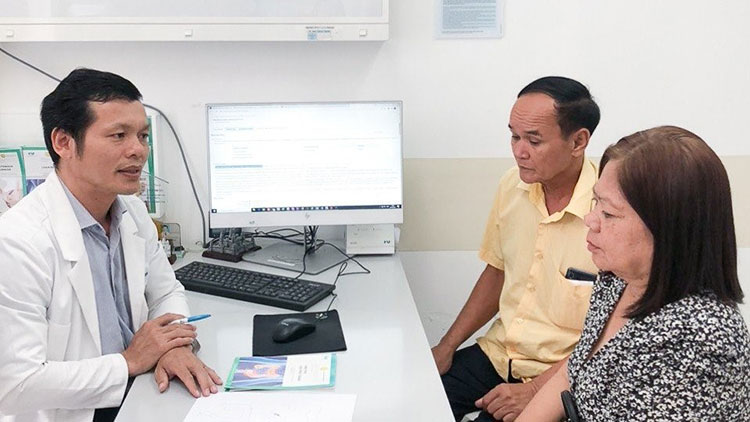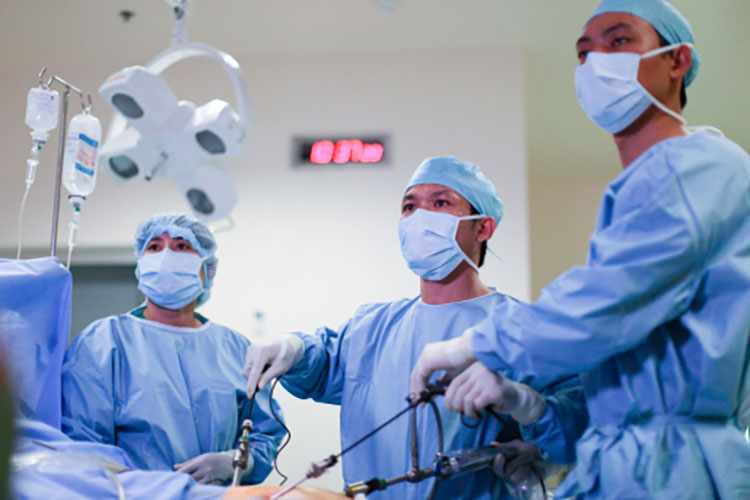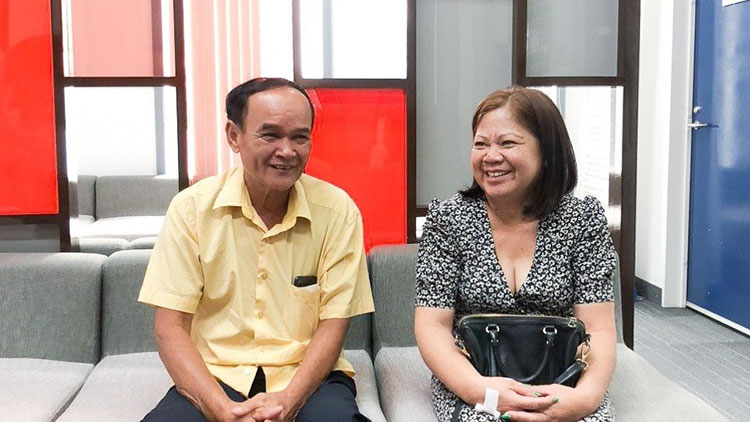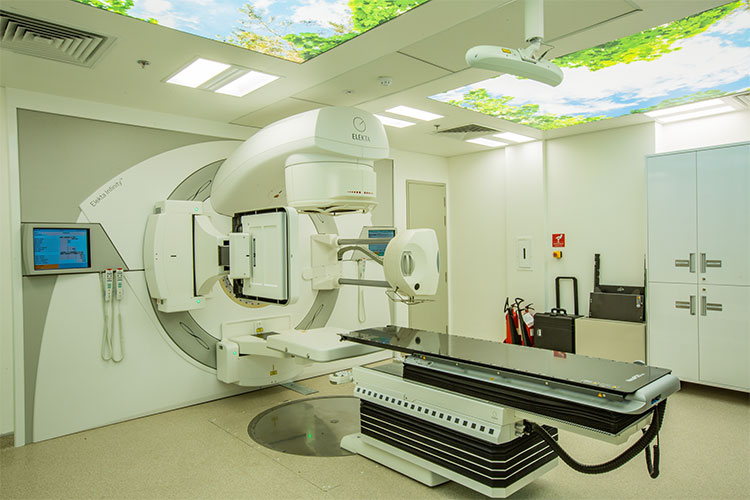Table of contents
If last-style cancer is detected and treated promptly and appropriately, patients can still continue to enjoy what remains of the life in comfort.
Roth Po, a patient from Cambodia born in 1964, is living a healthy life after nearly five years of treatment for stage 3C colorectal cancer.
Visiting Vietnam in search of opportunities for suitable treatment

Dr Phan Van Thai provides consultation to Mr Po during a follow-up visit
Mrs Po recalls how, five years ago, she and her husband took a flight from Cambodia to Tan Son Nhat Airport in Ho Chi Minh City so that she could receive care for her advanced colorectal cancer.
“As soon as the plane landed, my wife was immediately assisted onto a wheelchair and taken directly to the emergency vehicle to the hospital. My first impression of FV Hospital was that they offered highly professional service,” says Mrs Bo’s husband.
Mrs Roth Po’s journey began at the beginning of 2019 when she began experiencing abdominal pain. Her dull persistent pain lasted for four months, accompanied by the passage of blood during bowel movements. The intensity of her pain worsened day by day, leading her to be admitted to a hospital in Cambodia. “Initially, they said the treatment would take one week, but then it extended to two weeks. In the second week, the hospital informed us that they couldn’t provide any further treatment,” says Mrs Po’s husband.
The hospital couldn’t provide any specific treatment guidance and Mrs Po was desperate to learn more about her health condition. Mrs Po’s husband decided to seek treatment for her from a major hospital in Thailand after seeing his wife suffer from excruciating pain and becoming emaciated due to almost no food intake. However, the outlook wasn’t optimistic. Following the advice of their relatives, Mrs Po and her husband made the decision to come to FV Hospital in Vietnam for her treatment.
Three specialties collaborated in the five-hour surgery.
During the examination, Dr Phan Van Thai, Head of the General & Thoracic Surgery Department at FV Hospital, discovered a large solid mass in the lower abdomen of the patient, causing narrowing of the intestine. Various tests, endoscopy, biopsy, CT scan, and pelvic MRI revealed a tumour extending from the rectum, about five to six centimetre from the anal margin, with a length of approximately 15 cm. Dr Thai concluded that Mrs Roth Po had stage 3C colorectal cancer which had invaded the uterus, fallopian tubes, small intestine, and partially involved the pelvic colon. However, Dr Thai says that there was still hope for treatment as the tumour had not metastasized to distant organs such as the lungs or liver, nor spread throughout the abdominal cavity.
“The best option was to perform surgery early, within a few days, because the tumour was large and already showing signs of partial bowel obstruction. If we waited longer and the bowel obstruction worsened to a complete blockage, then it would require emergency surgery without adequate preparation. However, at that moment, there was still enough time for the patient to undergo a semi-elective surgery with relatively good preparation,” explains Dr Thai, who directed Mrs Roth Po’s treatment.

Dr Phan Van Thai performs surgery for Mrs Roth Po
During the emergency consultation, FV’s doctors reached a consensus that the surgery would involve the collaboration of three specialties. The general surgeon specialising in the gastrointestinal tract would be responsible for the main operation, the gynaecologist would perform the necessary procedures related to the uterus/vagina, and due to the proximity of the tumour to the urinary system, a urologist would assist by placing a catheter in the urethra to ensure the safety of the surgery and be ready to intervene if needed. Contingency plans were prepared to address any worst-case scenarios.
The complex colorectal cancer surgery lasted for five hours and was performed a day after Mrs Roth Po’s admission to the hospital. The surgical team successfully removed all of the organ tissue invaded by the tumour as a single unit while preserving the patient’s anus—a remarkable achievement.
“I feel that I’ve been reborn after the surgery.”
Following surgery, Mrs Roth Po followed the standard eight-cycle chemotherapy regimen of FV Hospital. When she returned for a follow-up examination at the end of March 2023, she was delighted to hear that her health was completely normal, with no signs of cancer. She mentioned that her body had recovered well, her appetite had returned, and her weight had increased from 49 kg to 62 kg. “I feel like I’ve been reborn after the surgery. I am grateful to the FV doctors for helping me regain my life,” Mrs Roth Po emotionally shares during her follow-up appointment.

Mrs Roth Po and her husband are delighted with the follow-up results after nearly five years of receiving treatment for colorectal cancer.
Dr Phan Van Thai says that Mrs Roth Po was successfully treated for colorectal cancer without recurrence for nearly five years. Previously, FV Hospital has also received and successfully treated several cases of stage 3 and 4 colorectal cancers, including those with large tumours with external invasion, regional lymph node involvement, and even cases admitted in a state of shock, hypotension, or infection.
This reality demonstrates that patients with terminal colorectal cancer can still hope to receive successful treatment and a good quality of life after therapy. It is estimated that for patients diagnosed with stage 3C cancer, without an additional treatment regimen after surgery, the five-year survival rate is approximately 30 percent. However, with the collaborative treatment approach of doctors, combined with chemotherapy medications, the chances of patient survival and disease recurrence can increase to around 50 percent.

FV Hospital is equipped with a full range of advanced technological tools for treating cancer patients.
In recent years, the number of colorectal cancer cases in Vietnam has increased, making it one of the top common types of cancer. Therefore, according to Dr Phan Van Thai, it is necessary to conduct colorectal cancer screening when there are unusual signs related to bowel movements or when a patient reaches the ages of 45 or 50. If there is a family history of colorectal cancer, colonoscopy should be performed five to 10 years earlier than the usual recommendation. Similar to other types of cancer, early detection increases the chances of successful treatment. It is encouraging that with advancements in modern science, some terminal cases still have the opportunity for successful treatment.
As a general hospital, the treatment of patients at FV Hospital always involves interdisciplinary collaboration. Experienced doctors at FV will jointly develop personalised treatment protocols, contributing to the success of the treatment process.
Find out more about colorectal cancer and other related conditions, please contact FV Hospital at: (028) 35 11 33 33.



